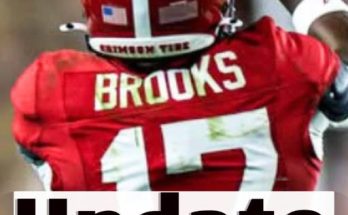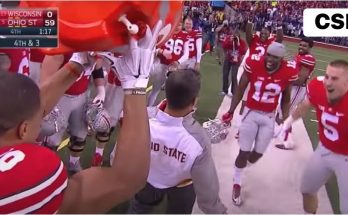Justin Fields delivered the kind of performance that silences doubters, humbles critics, and reminds the football world why he was once regarded as one of the most dynamic young quarterbacks in the NFL. Against the Cincinnati Bengals, the Chicago Bears signal-caller put together one of his most complete games in recent memory, completing 21 of 32 passes for 244 yards, adding 32 rushing yards, and scoring one touchdown — all without committing a single interception. The numbers alone paint a picture of efficiency and control, but the story behind them carries far more depth.
This game wasn’t just another outing for Fields. It was personal. Coming into the matchup, his owner — a controversial and outspoken figure who had publicly mocked Fields’ ability and leadership — seemed to spark something deep within the young quarterback. The doubts had been swirling for weeks: questions about his consistency, whispers about his decision-making, and constant chatter about whether the Bears should start considering other long-term options under center. Fields, however, chose to let his play do the talking.
From the opening drive, there was a different energy surrounding him. His footwork looked sharper, his decision-making more deliberate, and his confidence visibly unshaken. The Bears’ offensive line, often criticized for its inconsistency, held firm long enough for Fields to operate comfortably. He scanned the field with poise, finding open receivers and delivering crisp, accurate throws. The Bengals’ defense, known for their aggressive blitz packages and ability to force mistakes, struggled to contain him. Fields repeatedly punished them with precise passes into tight windows and timely scrambles that extended drives.
One of the defining moments of the night came midway through the second quarter. The Bears faced a third-and-eight deep in their own territory. The Bengals sent pressure, collapsing the pocket quickly. Fields stepped up, evaded two defenders, and fired a dart downfield to his tight end for a 22-yard gain. It was the kind of play that perfectly showcased his blend of athleticism and composure — the exact qualities that once made him one of the most highly touted dual-threat prospects in recent memory.
His lone touchdown pass didn’t come from a flashy deep shot or a trick play, but rather from a meticulously executed drive that reflected growth and maturity. Late in the third quarter, Fields led the Bears on a 10-play, 75-yard march that chewed up clock and wore down the Bengals’ defense. On the final play of the drive, he delivered a perfectly timed slant pass in the red zone, threading the ball between two defenders for a touchdown. The celebration that followed wasn’t loud or boastful — just a calm nod, a quiet acknowledgment that he had done exactly what he set out to do.
While Fields’ stat line was clean and efficient, what truly stood out was his demeanor. Gone was the hesitancy that sometimes crept into his play during difficult stretches. He looked in command, reading the defense with confidence and taking what was available instead of forcing big plays. His chemistry with the receiving corps seemed to click in a way that had eluded the Bears for much of the season. The short and intermediate passing game worked beautifully, as Fields distributed the ball among multiple targets, keeping the Bengals’ secondary guessing.
Equally impressive was how he used his legs — not recklessly, but strategically. Those 32 rushing yards came at crucial moments: third downs, broken plays, and instances where the pocket collapsed. His ability to escape pressure and reset the offense turned potential losses into manageable situations. That kind of decision-making is a hallmark of a quarterback maturing before the eyes of his teammates and fans.
But beyond the stats, this performance meant something more symbolic. It was a statement — not just to his critics or the ownership, but to himself. Fields has faced immense scrutiny since entering the league. He’s endured coaching changes, inconsistent play-calling, and constant questions about his fit in the Bears’ offensive system. Yet, amid all of it, he’s continued to show resilience. This game against Cincinnati represented a culmination of that perseverance — a showcase of what he can do when given the right environment and the right mindset.
The locker room atmosphere after the win spoke volumes. Teammates rallied around Fields, showering him with praise and celebrating his composure. One veteran lineman reportedly told reporters, “That’s our guy. He took everything they said about him and turned it into fuel.” It’s a sentiment that resonates throughout the fan base as well. Chicago has long been searching for stability at quarterback, and while one strong performance doesn’t erase years of frustration, it certainly rekindles hope.
Critics might argue that Fields still has much to prove — and they’d be right. Consistency remains the next hurdle. The NFL is a league that rewards repetition of excellence, not flashes of it. Yet even the harshest skeptics would admit that this outing showed clear growth. His mechanics looked smoother, his anticipation sharper, and his command of the offense much improved. Most importantly, he showed that he could play within the structure of the system without losing his trademark explosiveness.
For Bears fans, this game was a reminder of why patience can sometimes pay off. In a league that often discards young quarterbacks before they’ve had time to fully develop, Fields’ journey is a testament to the value of perseverance. The potential has always been there — his arm strength, mobility, and football IQ have never been in question. The missing piece has always been consistency and confidence. Against the Bengals, he appeared to find both.
As for his owner’s mockery, it now serves as nothing more than background noise — the kind of off-field distraction that Fields has learned to tune out. Instead of responding with words, he responded with performance. In sports, that’s often the most powerful answer. Every completion, every converted third down, and every composed read at the line of scrimmage felt like a rebuttal to every criticism that’s been thrown his way.
The Bengals, to their credit, didn’t make things easy. Their defense, featuring a formidable front seven, pressured Fields throughout the game. But each time they thought they had him cornered, he found a way out. Whether it was a quick release to a hot route or a perfectly timed rollout, Fields demonstrated control over the tempo and flow of the game. By the fourth quarter, Cincinnati’s defenders were visibly fatigued, struggling to contain his versatility.
Even in moments when the offense stalled, Fields’ body language never faltered. He encouraged teammates, communicated with coaches, and maintained a calm presence that spread throughout the sideline. That leadership — quiet yet commanding — is something the Bears have desperately needed. It’s the type of intangible quality that doesn’t show up on the stat sheet but defines great quarterbacks over time.
As the final whistle blew and the Bears walked off the field victorious, the story was no longer about ownership comments or criticism. It was about redemption, progress, and potential. Justin Fields didn’t just win a football game — he reclaimed control of his own narrative.
Moving forward, the challenge for Fields and the Bears will be sustaining this momentum. The schedule only gets tougher, and defenses will adjust, but this game offered a blueprint for success. When the offense is balanced, when Fields trusts his reads, and when the line gives him time to operate, the Bears can be competitive against anyone.
In the broader context of his career, this performance could serve as a turning point. Every great quarterback has that defining moment — the game that signals a shift from promise to realization. For Fields, this could very well be it. It wasn’t the flashiest performance of his career, nor was it a statistical explosion, but it embodied everything that makes him special: composure under pressure, the ability to adapt, and the heart to prove people wrong.



